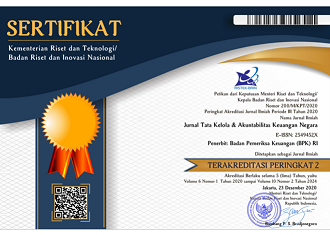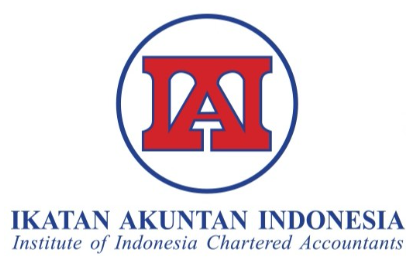DOES THE ROTATION OF HEAD OF AUDIT OFFICE ACROSS OFFICES IMPACT AUDIT QUALITY? STUDY CASE OF THE AUDIT BOARD OF REPUBLIC OF INDONESIA
DOI:
https://doi.org/10.28986/jtaken.v2i2.61Keywords:
Audit quality, office sizes, rotation, audit findings, audit reportAbstract
This study examines the effect of the head of audit office rotation on auditing quality. This study is motivated by two propositions in private sector auditing. First, that audit partners from larger audit offices are argued to be more experienced compared with audit partners from smaller offices. Second, the audit partners from larger audit offices also argued to be more capable of handling the rotation challenges. This study aimed to examine these propositions in a public sector setting by using the Supreme Audit Board of the Republic of Indonesia (BPK) as a case study, where the head of the representative office is the audit partner equivalent. This study tested these propositions by examining audit quality across BPK's representative audit office sizes and the effect of rotation and types of rotation of the head of the representative audit office on audit quality. This study used the number of audit findings in the financial audit reports as the proxy of audit quality. This study found that audit quality varies across office sizes in the BPK, where the larger representative offices tend to have a better audit quality. This study also found that the rotation of the head of the audit office is negatively associated with audit quality. Lastly, this study found that the negative effect of rotation is caused by the negative effect of changes in office sizes, which outweighs the positive effect of rotation.
Abstrak
Penelitian ini menguji dua argumen dalam konteks audit sektor swasta. Pertama audit partner dari kantor audit yang lebih besar dianggap memiliki kemampuan dan pengalaman audit yang lebih baik dari audit partner dari kantor audit yang lebih kecil. Kedua, audit partner dari kantor audit yang lebih besar juga dianggap lebih mampu menghadapi tantangan rotasi. Penelitian ini menguji kedua proposisi ini dalam konteks audit sektor publik menggunakan Badan Pemeriksa Keuangan (BPK) Republik Indonesia sebagai studi kasus. Penelitian ini untuk menguji kedua proposisi tersebut dengan meneliti kualitas audit antar kantor perwakilan BPK, efek dari rotasi dan tipe rotasi kepala perwakilan BPK terhadap kualitas audit, dengan menempatkan kepala kantor perwakilan BPK sebagai ekuivalensi dari audit partner pada sektor swasta. Penelitian ini menggunakan jumlah temuan audit dalam laporan audit atas laporan keuangan pemerintah daerah sebagai pendekatan  ukuran atas kualitas audit. Penelitian ini menemukan bahwa terdapat kesenjangan kualitas audit antar kantor perwakilan dengan kecenderungan kantor perwakilan yang memiliki entitas audit yang lebih banyak akan memiliki kualitas audit yang lebih baik dibandingkan dengan kantor perwakilan dengan entitas audit yang lebih sedikit. Penelitian ini juga menemukan bahwa rotasi kepala kantor perwakilan berdampak negatif terhadap kualitas audit. Lebih jauh, hasil penelitian ini menunjukkan bahwa dampak negatif tersebut disebabkan oleh dampak negatif perubahan ukuran kantor perwakilan, yang lebih besar dari dampak positif rotasi itu sendiri.
References
Badan Pemeriksa Keuangan Republik Indonesia. (2014). Keputusan BPK RI Nomor 3/K/I-XIII.2/7/2014 tentang Organisasi dan Tata Kerja Pelaksana BPK.
Badan Pemeriksa Keuangan Republik Indonesia. (2014). Keputusan Ketua BPK 13/K/I-XIII.2/12/2014 tentang Peringkat Jabatan dan Tarif Tunjangan Kinerja Pegawai di Lingkungan Badan Pemeriksa Keuangan.
Badan Pusat Statistik. (2014). Statistik Keuangan Pemerintah Daerah Tahun Anggaran 2010-2014.
Bamber E. M., and Bamber L.S. (2009). Discussion of Mandatory Audit Partner Rotation, Audit Quality, and Market Perception: Evidence from Taiwan. Contemporary Accounting Research, 26(2), 393-402.
Bills, K. L., Swanquist, Q. T. & Whited, R. L. (2016). Growing Pains: Audit Quality and Office Growth, Contemporary Accounting Research, 33(1), 288-313.
Cameran, M., Francis, J. R., Marra, A. & Pettinicchio, A. (2013). Are there adverse consequences of mandatory auditor rotation? Evidence from the Italian experience Auditing: A Journal of Practice & Theory, 34(01), 1-24.
Cagle, C. S. & Pridgen, A. B. (2015). Accountability in County Governments: Is Auditor Type Related to Audit Quality? Journal of Leadership, Accountability, and Ethics, 12(1),79.
Campbell, D. (2008). Nonfinancial Performance Measures and PromotionBased Incentives Journal of Accounting Research, 46(2), 297-332.
Choi, J.H., Kim, C., Kim, J.B. & Zang, Y. (2010). Audit office size, audit quality, and audit pricing. Auditing: A Journal of Practice & Theory, 29(1), 73-97.
Daugherty, B. E., Dickins, D., Hatfield, R. C. & Higgs, J. L., (2012). An examination of partner perceptions of partner rotation: Direct and indirect consequences to audit quality Auditing: A Journal of Practice & Theory, 31(1), 97-114.
DeAngelo, L. E. (1981). Auditor size and audit quality Journal of Accounting and Economics, 3(3), 183-199.
Francis, J. R., & Yu, M. D. (2009). Big 4 office size and audit quality The Accounting Review, 84(5), 1521-1552.
Francis, J. R., Michas, P. N. & Yu, M. D. (2013) Office size of Big 4 auditors and client restatements. Contemporary Accounting Research, 30(4), 1626- 1661.
Gul, F. A., Wu, D. and Yang, Z. (2013) Do individual auditors affect audit quality? Evidence from archival data, The Accounting Review, 88(6), 1993-2023.
Hamilton, J., Ruddock, C., Stokes, D. J., & Taylor, S. L. (2005) Audit partner rotation, earnings quality, and earnings conservatism. Working Paper, available at http://papers.ssrn.com/ sol3/papers.cfm?abstract_id=740846 viewed 1st March 2016
Hardies, K., Breesch, D. & Branson, J. (2014). Do (Fe)Male Auditors Impair Audit Quality? Evidence from Going-Concern Opinions, The European Accounting Review, 1-28, DOI:10.1080/09638180 .2014.921445
Ittonen, K., Vähämaa, E. & Vähämaa, S. (2013). Female auditors and accruals quality Accounting Horizons, 27(2), 205-228.
Lennox, C.S., Wu, X., & Zhang, T. (2014). Does the mandatory rotation of audit partners improve audit quality? The Accounting Review, 89 (5), 1775-1803.
Litt, B., Sharma, D. S., Simpson, T., & Tanyi, P. N. (2014) Audit partner rotation and financial reporting quality Auditing: A Journal of Practice & Theory, 33(3), 59-86.
Schelker, M. (2008). Auditors and Corporate Governance: Evidence from the Public Sector, Working Paper, available at SSRN: http://ssrn.com/ abstract=959392 viewed on 20th March 2016
Sundgren, S. and Svanstr, T. (2013) Audit office size, audit quality, and audit pricing: evidence from small-and-medium-sized enterprises Accounting and Business Research, 43(1), 31-55.
Republik Indonesia. (2006). Undang-undang Nomor 15 tentang Badan Pemeriksa Keuangan Republik Indonesia.
Downloads
Submitted
Accepted
Published
How to Cite
Issue
Section
License

Jurnal Tata Kelola dan Akuntabilitas Keuangan Negara is licensed under
a Creative Commons Attribution-ShareAlike 4.0 International License




















